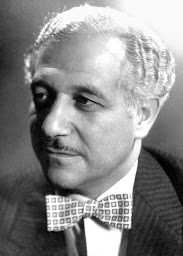Tarázu’lláh (Ornament of God) was the name given by Bahá’u’lláh to the son of Samandar,[1] one of the nineteen Apostles of Bahá’u’lláh, and Ma’súmih Khánum Farhádí, both from families of early Bábís. ‘Abdu’l-Bahá called him Mírza Taráz and bestowed upon him many honorifics including Taráz-i-Iláhí (The Divine Adornment). The beloved Guardian addressed him as Jináb-i-Samandarí and appointed him a Hand of the Cause, one of the twelve in the first contingent, on December 24, 1951.
Tarázu’lláh Samandarí was born in 1874, in Qazvín, Persia, and was brought up by his parents and his grandmother, who was one of the companions of that immortal early heroine of the Faith, Táhirih. His upbringing is described by ‘Abdu'l-Baha, in a prayer revealed for him:
“...I supplicate before the Throne of Thy mercifulness and the threshold of Thy oneness that Thou mayest rain down Thy manifold confirmations and favours upon this servant of Thine who was born in the cradle of Thy love, nourished from the breast of Thy knowledge, reared in the lap of Thy servitude, nurtured in the bosom of Thy life-giving Faith, until such time as he was fully developed through the outpourings of Thy bounty, attained maturity through Thy loving kindness and turned his face with devotion toward Thy countenance, with his heart wholly centred on Thee and his reliance completely placed in Thee ...”
The life of Tarázu’lláh Samandarí, his character and the quality of his service to the Faith, are best described by the pens of ‘Abdu’l-Baha and Shoghi Effendi. ‘Abdu’l- Bahá designated him in Tablets as "a luminous candle", "a cause of happiness of souls", "a mine of joy", and "a cause of happiness of hearts".
The exceptional number of years of Tarázu‘lláh Samandarí’s active service commenced in early youth and ceased only with his passing in his ninety-fourth year. His service spanned the last years of the ministry of Bahá’u’lláh, the whole of the ministries of ’Abdu'l-Bahá and Shoghi Effendi, and extended through the period of stewardship of the Hands of the Cause. He lived to witness the election of the Universal House of Justice in 1963 and 1968.
Because educational facilities were limited in the Persia of his childhood, and often denied to the children of Bahá'is, Tarázu'lláh was taught at home by Mullá ‘Alí who was praised by Bahá'u'lláh as the first teacher to put into practice the Bahá'í principles of education. The child learned Persian and Arabic grammar, the simple bookkeeping of that period and calligraphy. At the age of thirteen he entered the office of his father who was a merchant.
























